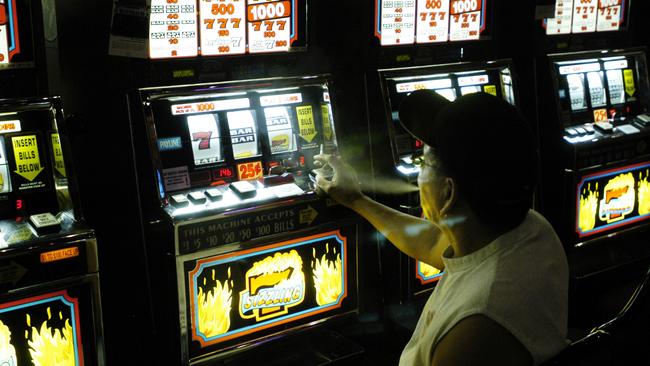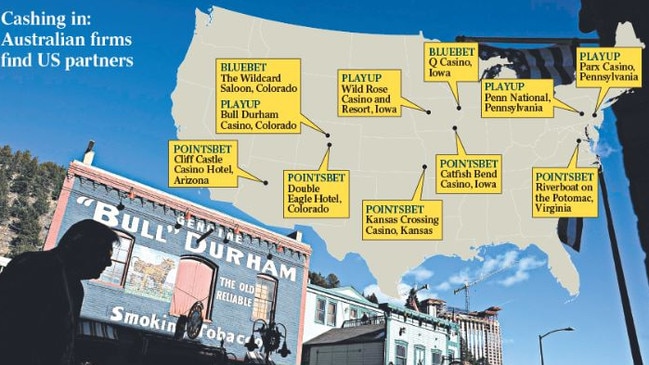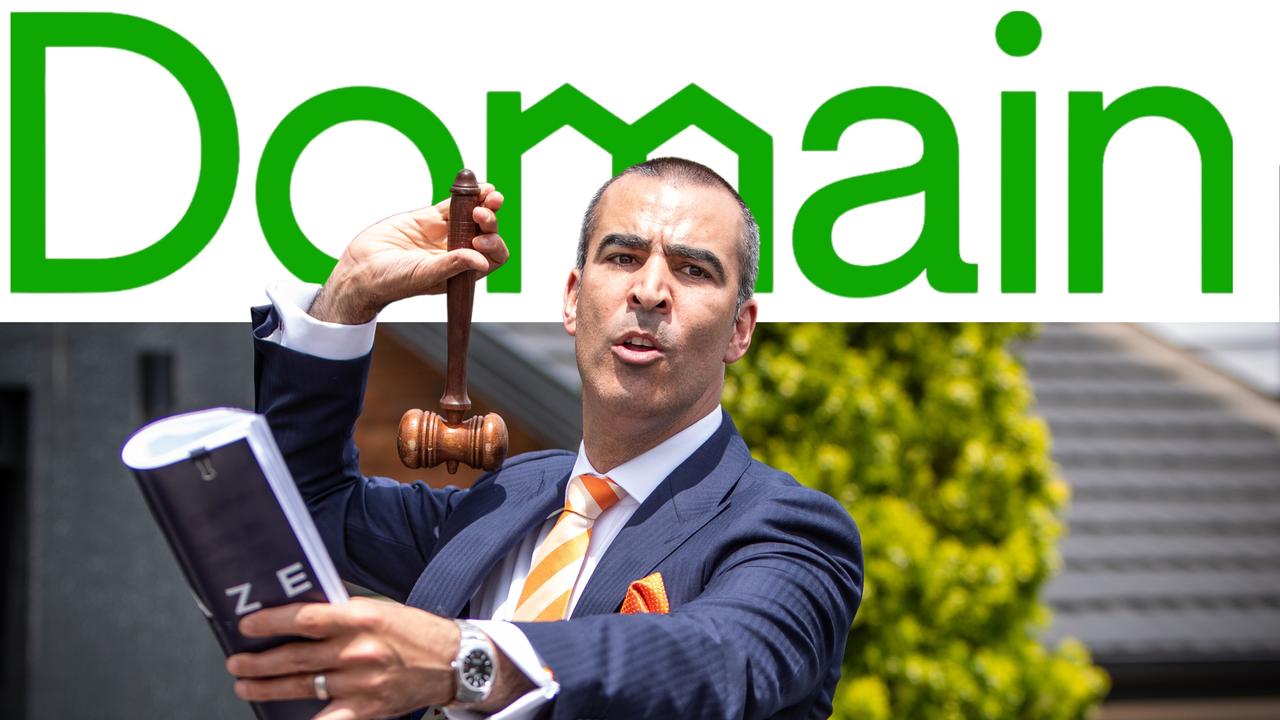How Middle America’s casinos are fuelling Australia’s betting revolution
Small-town US gaming dens offer an entry point for Australian firms into the lucrative online wagering market.

The small seaport town of Colonial Beach on the Maryland and Virginia state border about 100km south of Washington DC seems an unlikely place for an Australian betting revolution.
A quaint resort nestled on the giant Potomac River, Colonial Beach is also the site of the Riverboat on the Potomac Casino.
American casinos are not all like the glitz and glamour of the fabled Las Vegas strip. The Riverboat on the Potomac is a small casino once known as “Little Reno”, on a pier as long and as wide as a football field.
Its investors say it is a “fine facility where you can enjoy a walk along our beachfront, dining, satellite simulcast horse racing, and of course one of the finest retail sportsbooks anticipated in the state of Maryland”. It also has a banquet hall and liquor store open every day.
Crucially, small outlets like the Riverboat have something else vital to the big global betting companies and Australian firms alike: the ability to piggyback off its casino licence to offer online sports betting, and access to a huge new sports-mad market in the US where online betting has only recently been allowed for the first time across big parts of the population.
Therefore, a deal the Potomac’s owners struck last May with ASX-listed PointsBet, headquartered in Melbourne, was a company-altering agreement for both and proof of the betting gold rush taking place across the US.
The deal gave PointsBet market access in Maryland, under what is known as a “skin” agreement, for 10 years. It pays Riverboat market access fees and a portion of net gaming revenues from online and retail sportsbooks.

‘Explosive’ market
The term skin refers to the unique brands that can operate under each individual gambling licence, and the competition is fierce in what has been called an “explosive” market.
Riverboat on the Potomac investor Tony Jones is keen to tell the story: “We are truly honoured to have this opportunity to share with you and the world our good fortune to partner with PointsBet, a premier sports-betting operator,” he tells The Weekend Australian from Maryland.
He was particularly impressed at PointsBet’s personal touch, with its vice-president of corporate development Paul Hannon, driving almost four hours from his office in Philadelphia along the I-95 to visit the Riverboat.
Hannon was the only suitor to make the trip. “To do that meant a lot and gave ownership an opportunity to understand the people behind the curtain,” Jones says.
PointsBet chief executive Sam Swanell remembers driving 2½ hours through the Iowa corn fields with rain sheeting down sideways to spend six hours testifying before state government authorities for his company to eventually gain a skin licence with the Catfish Bend Casino in Burlington.
“I met with our partners there and went out to a fantastic restaurant down on the Mississippi River. And it’s one of those experiences where you go OK, well, I’ve had the benefit of going to New York and Las Vegas but I’ve also had the benefit of having dinner at a restaurant on the Mississippi. It was great,” Swanell says.
“If you’re going to convince these guys to partner on their licence and on their skin, they have to be convinced you’re going to have some success because we basically pay them a clip of the ticket for the right to use the skin.
“But there is definitely a major element of this that’s built around relationships. So I’ve done a lot of road trips there and we’ve got a lot of people on the ground now too.”
Swanell was also in the US when the US Supreme Court struck down the Professional and Amateur Sports Protection Act, in May 2018, and since then sports betting across the US has boomed. Goldman Sachs projects the size of the US sports betting market to soar from $US900m to $US39bn ($53bn) by 2033.
Jones says the market has become “explosive”, with those who are tech-savvy likely to succeed.
“The airways are flooded with ads, commercial endorsements by current and former professional athletes, and other movie/entertainment personalities,” he says.
“Major US media and broadcasting outlets have all jumped in with an ever-growing number of gaming partners and betting opportunities. Our PointsBet partner’s exclusive agreement, signed with NBC – one of the largest networks in the US – was for Riverboat on the Potomac a game-changing move, and we could not be any more excited.”
Trevor Croker, chief executive of ASX-listed poker machine giant Aristocrat, which services the US regional and tribal casino market as well as the bigger centres of Las Vegas and Atlantic City, says such deals make sense.
“The first thing is most of those (US gambling) licences are going to be held by traditional bricks-and-mortar operators, not by B2C (online betting) operators,” Croker says. “So that’s the most logical way for them to enter that (online sports betting) market. How they scale and can they get scale is going to be a bigger question.”
Bluebet, another ASX-listed company and headquartered in Sydney, has secured two skin agreements as part of its US expansion – in Iowa and in Black Hawk, Colorado.
Black Hawk, a former mining town with a population of 127, battled a decline during the 20th century before it morphed into a casino town in 1991. Now it is seeking to transform itself again, capitalising on the online betting boom.
Bluebet has partnered with the Wild Card Saloon and Casino, a two-storey historic weatherboard building painted in two shades of green with an American flag above one of its front windows.
According to the Colorado Casino’s website, the Wild Card Saloon is a “local employee hangout that offers home cooked meals, decent prices and a regular convenience store in the back”.
“You can get cheap cigarettes, candy, drinks, etc. The casino itself has slots and ongoing promotions and a loyal following of customers who appreciate the small town feel of the Wild Card – not to mention the occasional live music.”
It seems an unlikely site to also feature paraphernalia for an Australian betting company. But Bluebet’s agreement with the Wild Card Saloon gained it the right to take online sports bets across all of Colorado – the US’s sixth-largest sports wagering market, with turnover of $US3.7bn last year, 98 per cent of which was mobile or online.
Bluebet CEO Bill Richmond says the Wild Card Saloon deal is a big opportunity and mutually beneficial for both parties. “They don’t have the scale (to offer online betting),” Richmond says.
“There are other states with some bigger casinos that have the financial wherewithal to open a sportsbook. But the reality is, they don’t have the experience in running a profitable sportsbook.
“I mean, it’s very different to running a casino. A lot of people thought originally that you just put up a website, put up prices and you’ll make money. Unfortunately, if bookmaking was that easy, everyone would be doing it. There’s more to it than that. That’s where we come in.”
Next door the Wild Card Saloon is the Bull Durham Casino. Like the Wild Card, it is a historic building and houses slot machines and three coin bar video poker. Sharp Shooter members receive free hot dogs, claimed as the “best in Black Hawk”.
And also like the Wild Card Saloon, Bull Durham has attracted an Australian partner, the privately owned PlayUp, which has skins with established casinos and racetracks ranging from Pennsylvania-based Parx Casino and Penn National that give it access to New Jersey to the renowned Caesars Entertainment for iGaming, or online casino licences.
But PlayUp’s first deal was with the Bull Durham Casino, which has been operating for almost 30 years. Matt Davey, an Australian gambling entrepreneur based in Las Vegas, says there has been a rush to grab online licences every time another state opens up market access.
“Each state takes their own approach on how to do things. You might have a state where a land-based licensed casino will be issued, for example five skins for iGaming and another three for sports betting,” Davey says.
“Then the international or interstate operators gain licences to operate online after striking agreements with the land-based entities. They will come to agreements on revenue or profit share, or however the joint venture is arranged. But it can be different across other states. For some states, such as Texas, there are no land-based casinos. There you are likely to have sports teams that have the licences.”
It is a big opportunity, which is why last month PlayUp struck an agreement with a new team in the National Lacrosse League based in Fort Worth, Texas: the Panther City Lacrosse Club.
PlayUp will become Panther City’s fantasy sport and e-sports sponsor. Crucially, the deal also includes a market access element, which means that if sports betting is legalised in Texas, the partnership could secure PlayUp access to a huge state.
“Every state is unique and it is really different to Australia where you have a deal with the government,” PlayUp chief executive Daniel Simic says. “In the US, you deal with casinos or racetracks, or sports teams like lacrosse.
“The deals can often be about who you know too. A couple of the deals that we did was because our lawyers introduced us to the operators there. We did a lot of talking and eventually were able to get the deals done. It is different.”
It is a similar story with PointsBet’s recent deal to back curling in Ontario, Canada. While an Australian company being involved in a quintessentially – and unique – winter sport seems odd at first glance, Swanell points out that a recent curling event in Canada’s most populous state had 2½ times the television audience than that night’s Toronto Raptors NBA basketball game.
“We’ve also done a deal with the Trailer Park Boys TV series there and the ads we’ve done have already had more than 120,000 views on YouTube,” Swanell says. “It’s early days but it looks like that strategy is going to resonate.”
But Davey warns that the intense competition from international giants piling into North America and from established casinos creating their own digital betting operations will eventually cause a shake-out.
“We keep seeing states open up [to online betting] at a quicker rate than we expected, and the uptake by consumers keeps happening at a quicker rate than we expect too,” Davey says.
Consolidation ahead
“You’ve already seen asset price inflation and now the market, which previously was valuing these [listed] companies on their expansion, are looking at more traditional things like cashflow. Eventually you will see a period of consolidation and asset price adjustment.”
Davey points out there are 37 betting operators all trying to get a piece of the action and, while the size of the market is increasing, the competition for punters and licences means many ventures can be unprofitable and skin agreements untenable in financial terms.
“You might see a few of these go bankrupt. And you’re already seeing some operators pulling out of some markets,” he says.
Already, some big names like Caesars have indicated they will pull back on their heavy marketing spend. Meanwhile, Churchill Downs, the owner of the famous racetrack that hosts the Kentucky Derby, is shutting its TwinSpires online sports and casino business after recording heavy losses.
Swanell concurs that there will be rationalisation, naming more than 30 brands from the US, Europe and Australia that PointsBet competes with.


